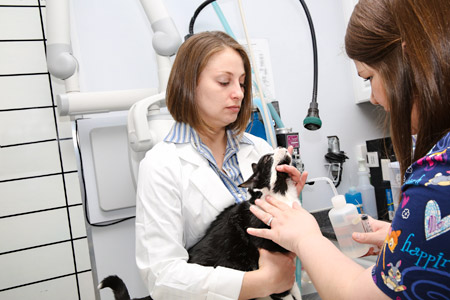 Cancer is a common and serious disease process. Many people have had or will have personal experience with cancer in themselves, a family member, or a close friend. The diagnosis of cancer in a beloved pet can be extremely upsetting and the worry of upcoming cancer treatments such as surgery or chemotherapy can be equally stressful. Depending on the form of cancer diagnosed, there is good news that treatment can give a very good quality of life.
Cancer is a common and serious disease process. Many people have had or will have personal experience with cancer in themselves, a family member, or a close friend. The diagnosis of cancer in a beloved pet can be extremely upsetting and the worry of upcoming cancer treatments such as surgery or chemotherapy can be equally stressful. Depending on the form of cancer diagnosed, there is good news that treatment can give a very good quality of life.
Pursuing treatment for cancer in your family pet can be a very difficult decision. There are several factors to consider when deciding upon treatment- the type of cancer diagnosed, practical concerns ( your pet’s temperament and stress level, the need for frequent follow up veterinary visits etc.), and finances all play a part in this decision. We encourage you to discuss your concerns with our veterinarians at Burnhamthorpe Animal Hospital to help you make the best decision possible for you and your beloved pet.
At Burnhamthorpe Animal Hospital, we understand that you need to know all your pet’s options. We offer a team based approach to diagnosis, management and treatment of many types of cancer. At our hospital we offer advance diagnostic techniques, endoscopy, radiology, soft tissue surgery and some chemotherapy. Through the consultation process, we discuss treatment options clearly to help you in the decision making process. Not every pet with cancer can or should be treated. When people with cancer go through difficult treatments in an attempt to cure their cancer, they have the understanding of what’s happening to them and actively make the decision about their own treatment course. However, pets can’t make those decisions and have no understanding of the treatment process, therefore it is our responsibility as care-givers and your responsibility as loving pet owners, to assure that pets undergoing cancer treatment will have a reasonable chance of success with minimal side effects.
In cases that are in need of a specialist we offer referral to a veterinary oncologist. A veterinary oncologist is specially trained to diagnose and treat animals with cancer. A veterinary oncologist is board-certified as a specialist in the treatment of cancer by the American College of Veterinary Internal Medicine (ACVIM). This advanced training allows specialists to deal with complex and uncommon cases and to potentially provide diagnostic testing or treatments that may not be available at our veterinary hospital
What is cancer?
Cancer is a mass of abnormal cells with uncontrolled growth. Tumours are classified as either benign or malignant. Benign tumours usually grow very slowly and generally do not spread. Malignant tumours initially grow in the organ where the cancer started and can be more aggressive and spread (metastasize) to other areas of the body. The more advanced the cancer (the more the cancer has spread) the more difficult it is to control.
We usually cannot tell if a tumour is cancer until a biopsy test is done and the tissue is sent away for analysis. We usually get a sample with either a fine needle aspirate, which draws out some cells from the tumour with a small needle or a biopsy where a tiny piece of tissue is removed . A specialist veterinarian called a pathologist studies the tissue under a microscope to see if it is cancer.
What are the different types of cancer?
There are hundreds of different types of cancer. The major classifications of cancer are:
Carcinoma: a malignant tumour found in the outermost covering or lining of body surfaces or organs. These tumours are found on the skin, in the mouth and throat, stomach and bowel, or in organs like the mammary gland, liver, lung or bladder.
Sarcoma: malignant tumour found in the structural tissues of the body such as bone, muscle and cartilage.
Round Cell tumours: malignant tumours often made up of different immune cells. Mast cell tumours and lymphoma are examples of this type of tumour.
What is meant by staging?
Tumours also classified as a “stage” to indicate the extent of the tumour locally and throughout the body. The pathology report and other diagnostic tests (such as chest xrays) allow us to stage the tumour. In general, the higher the stage of cancer the more difficult it is to treat.
How is cancer treated?
Cancer is usually treated by surgery, radiation therapy or chemotherapy. Sometimes treatments are combined to provide the best patient care.
Surgery: the tumour and some surrounding areas of normal tissue are removed during an operation.
Radiation therapy: x-rays, gamma rays and other sources of radiation destroy the cancer cells in the area treated.
Chemotherapy: medicine that is taken by mouth or injected into a patient’s vein or under their skin. It travels through the body and works to destroy or stop the growth of cancer cells wherever they are within the body. Chemotherapy is given as a series of treatments. The particular drug used and the length of course of treatment depends on the type of cancer.
What are the side effects of chemotherapy?
The goals of chemotherapy in veterinary medicine are different from those of human medicine, with a focus on maintaining quality of life during cancer treatment. Because of this conservative approach, the majority of canine and feline patients do not experience significant side effects.



